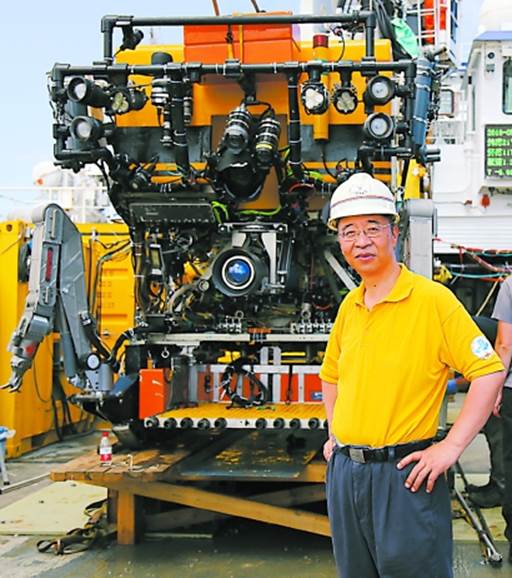
Prof. ZHOU on board the ocean scientific research ship
A few days ago, ZHOU Huaiyang, a professor at Tongji University’s School of Ocean and Earth Sciences, sent a WeChat Moment:
With the help of advanced deep-diving technology, it is still a little happy to
present a small, vibrant oasis on the dark seabed of the South China Sea
in front of the world for the first time. Many thanks to all of our colleagues
for their close cooperation and many contributions!
For the first time, a team of Chinese scientists conducted a comprehensive observation of a 30,000-square-meter patch of active cold seep communities at more than 1,000 meters beneath the seabed in the South China Sea via an unmanned deep-sea submersible. This major accomplishment made the Chief Scientist, who has been responsible for more than ten scientific expeditions in China’s oceans and offshore waters, very gratified.
Expanding cognitive boundaries
The deep seabed resembles a land desert because of its permanent darkness. However, there are deep ocean oases with a large biomass, albeit small, in some locations where hydrothermal and cold seeps are generated by upward spouts or seepage of seabed fluids. Prof. ZHOU said:
There are large amounts of methane leaking upward through the
fissures, supporting a high density of large cold seep communities that are
dominated by Bathymodiolus platifrons (up to 273 per square meter) and
Shinkaia Crosnieri (up to 300 per square meter). Among these, there are
29 species of macrofauna, of which 10 species are new records found in this study Prof. ZHOU said proudly. He continued: “It is like a piece of delicious strawberry cake in the dark. Originally, we could only eat it in the dark with a fork. We don't know how big the cake is, how much cream there is, and where the strawberries are. But finally, we can now see the cake.
“It has been a full year and a half since the last time we conducted a scientific expedition in oceans,” he said. On March 6 of this year, Prof. ZHOU had been scheduled to join scientists from Germany, the United States, and other countries to continue his research in the Southwest Indian Ocean. However, the pandemic prevented the plan from being carried out as scheduled,, which made Prof. ZHOU miss the ocean very much. Someone once asked him his meaning of work. He responded: “There are many unknowns in this world, especially in deep space, in the ocean, in the microscopic world. Every effort made in exploration is to expand the boundaries of cognition continuously.” As a Chinese scientist who has been engaged in marine research for 30 years, the sense of mission in his heart makes this persistence in the ocean run even deeper.
Being totally engrossed in the ocean
The word “Yang” in ZHOU Huaiyang’s name means “the sun” (“Yang” in Chinese Pinyin), but his career was bound up with “the ocean” (also “Yang” in Chinese Pinyin). Prof. ZHOU said:
The ocean dream is an ideal I have set up since I was a child.
I have never regretted embarking on the path of studying marine geology.
Although there are sweets and bitters, I have also seen scenery that
ordinary people do not see.
In the 1990s, the study of marine geology in China was beginning. Prof. ZHOU changed his work from land to sea for 30 years. He has served as Chief Scientist of China’s Ocean Scientific Research and Offshore Survey many times. Ocean surveying is challenging and requires years of tossing and turning on scientific research ships. However, he always looked forward to a new voyage every time he stayed on land for long periods.
In 2003, he participated in China’s first global scientific research as one of the primary personnel. In 2005, as Chief Scientist of the Chinese side, he planned, organized, and led the first Sino-US joint deep-diving scientific voyage, providing valuable and practical opportunities for the training of the first generation of deep-diving operators in China helping to improve the engineering system design of China’s manned submersible, and also for obtaining well-preserved submarine hydrothermal sulfide samples which promoted previous research of submarine hydrothermal activities in China.
The year 2013 is select in Prof. ZHOU’s academic career. In June of that year, he used self-developed fluid samplers and other equipment to collect a variety of precious samples for the first time in China’s deep seabed during the first scientific experimental application voyage of the Chinese manned deep-sea research submersible “Jiaolong”--the South China Sea voyage. This included a pressure-holding fluid. Many people have asked him how he feels to be the first to ever dive the ocean? He answered with great pride: “Deep sea, the Chinese are coming.”
“Learning must be based on interest. I hope that young people can put forward their research directions so that they can do a better job in their major,” Prof. ZHOU said. As a veteran who is still on the frontline of scientific research, he hopes that more talented young people will join them and become a new force in China’s marine research.
Reported by PENG Deqian
photo provided by ZHOU
Source: https://www.jfdaily.com/journal/2020-09-28/getArticle.htm?id=300849